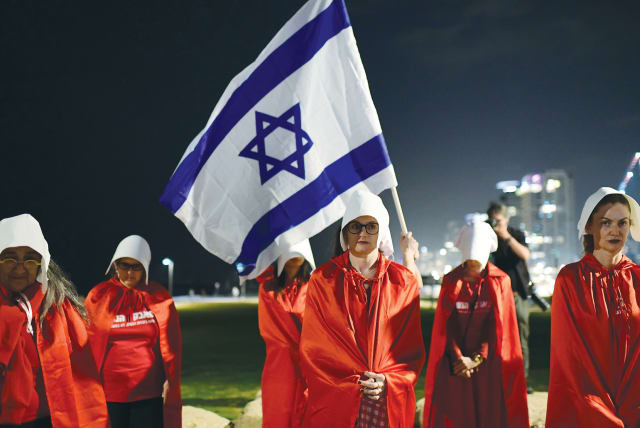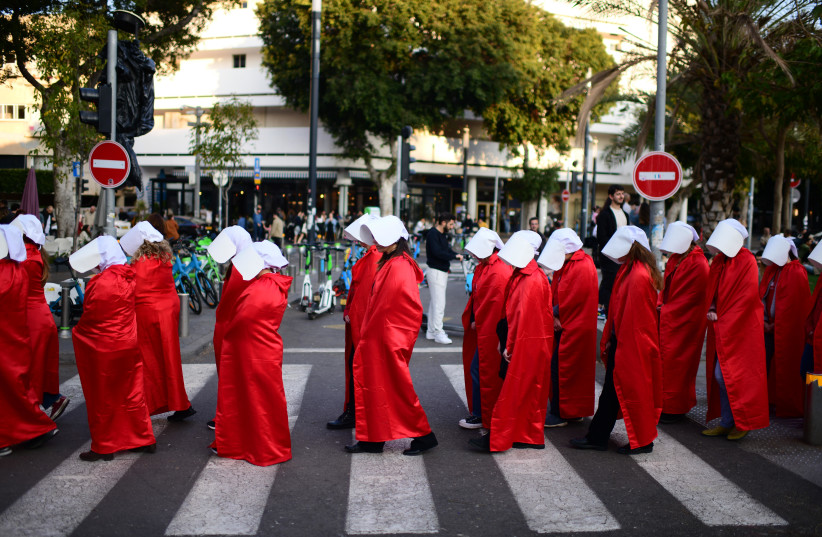The discourse putting the High Court as womens' savior is a lie - opinion

Even when the High Court chooses to uphold women’s rights, in its eyes some women are more equal than others.
The theme of women’s rights and the imagery of The Handmaid’s Tale have become central to the recent anti-government protests. The message is clear – any changes to the judiciary would give rise to misogyny.
Unfortunately, the perception of the Israeli High Court of Justice as the bastion of women’s freedoms is truly the stuff of science fiction and fantasy.
It’s not often that you remember a client 20 years down the road. Yet, one uneventful morning in 2004, the translation company which I owned at the time, received a heavy file of documents for translation from a man by the name of Michael Sabbag. A quick perusal revealed that Sabbag was a get (Jewish divorce document) refuser from Monaco, holding his wife Chantal Bitton as an aguna (a Jewish woman who is “chained” to her marriage) for 7 years.
High Court fails to protect aguna
In a brilliant maneuver, an Israeli rabbinical court enticed him to come to Israel and then issued an injunction preventing Sabbag from leaving the country until he would issue a get. Now Sabbag was suing the rabbinical court in the High Court to be able to leave Israeli freely without releasing Chantal, his wife.
Having translated for numerous aguna resolution cases, we verified the story with our rabbinical contacts in France and we refused to provide Sabbag with services.
Seven months later, the High Court upheld Sabbag’s claim. When faced with an opportunity to give a woman her freedom or curtail the authority of rabbinical courts, the justices chose the latter. In the majority ruling, (female) Justice Ayala Procaccia ruled that the Israeli rabbinical courts did not have jurisdiction over foreign nationals. This effectively prevented Israeli rabbis, holding numerous tools to make recalcitrant husbands “see the light,” from helping any woman who was not an Israeli citizen.
The court could have ruled differently. In a minority opinion, justice Elyakim Rubinstein found the legal grounds to uphold the rabbinical courts’ jurisdiction. Moreover, just one year prior, justice Aharon Barak himself ruled in favor of the rabbinical courts in the Kubani case, ruling that they could hear alimony cases involving foreign citizens.
Thankfully, it was the Knesset that a year later returned some of the authority back to the rabbinical courts, so that more women could be helped.
Procaccia continued her quest against rabbinical courts in the 2005 Levi case, when together with two other female justices, Devora Berliner and Miriam Naor, she nullified the rabbinical court’s order to the recalcitrant husband to issue a get. Although Yehezkel Levi had sworn never to issue a get to his wife Rivka, the High Court jumped on the opportunity to limit the rabbinical courts at the expense of another woman’s freedom. Procaccia used the case to lash out against rabbinical courts in what she claimed was a “usurpation of power.”
The High Court hasn't been protecting women
YET THE High Court’s anti-women rulings have not been limited to overturning get decisions. Despite evidence that African foreign migrants are four times more likely to commit sexual assault and rape than Israeli citizens, over the past 15 years the High Court repeatedly abolished numerous government initiatives to curtail illegal immigration from Sudan and Eritrea.
As a result, on average over 70 women a year are forced to suffer forever the consequences of the court’s refusal to uphold basic governance and the rule of law. These statistics do not include hundreds of cases of physical assault each year committed by illegal migrants at 3 times their rate in the population, often against elderly women. Esther Galili and Olympia Haviv are just two such women, senselessly murdered in Southern Tel Aviv by illegal African migrants.
Yet, even when the High Court chooses to uphold women’s rights, in its eyes some women are more equal than others. Over the past several years, I have been a party to the case around the prayer arrangements at the Kotel.
During the most recent hearing last month, Justice Daphne Barak-Erez asked the state attorney’s representative – with a straight face – why the police do not remove all worshipers, including thousands of women, from the Kotel Plaza to make room for the several dozen Women of the Wall.
At first, I thought I didn’t hear right. But as my friends looked at each other in shock and disbelief at the mere suggestion of such injustice, it became quite clear to us, yet again, that women’s rights, especially those on the wrong side of the political agenda, are the furthest thing from the justices’ minds. In the quest to create their own social order and engineer the Israeli reality, we as women and our basic rights did not count at all.
And so, to my fellow sisters marching in red capes and white bonnets I say, please leave the world of fantasy. Israel is not about to turn into Gilead and the High Court is unlikely to become your savior.
It is only with both feet firmly planted on the ground, through rigorous yet respectful dialogue, free of drama and emotional manipulations that we can create a balanced and functioning government, in which all rights, those of women and men alike, are truly respected.
The writer is the Israel director at Am Echad, an organization promoting the relationship between Israel and the Diaspora and cofounder of Our People, assisting Ukrainian and Russian olim in Israel.
Jerusalem Post Store
`; document.getElementById("linkPremium").innerHTML = cont; var divWithLink = document.getElementById("premium-link"); if (divWithLink !== null && divWithLink !== 'undefined') { divWithLink.style.border = "solid 1px #cb0f3e"; divWithLink.style.textAlign = "center"; divWithLink.style.marginBottom = "15px"; divWithLink.style.marginTop = "15px"; divWithLink.style.width = "100%"; divWithLink.style.backgroundColor = "#122952"; divWithLink.style.color = "#ffffff"; divWithLink.style.lineHeight = "1.5"; } } (function (v, i) { });

